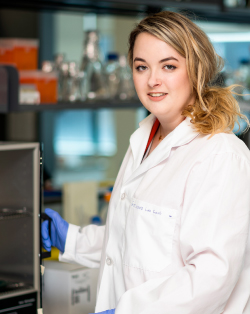Going with the flow

Where are you from?
Happy Valley – Goose Bay, Labrador
Where, and in what area, did you do your undergraduate or previous graduate work?
Bachelor of science in biology at Memorial University.
Are you the first person in your family to go grad school? If so, how did that shape your graduate experience?
Yes, I'm the first person in my family to attend graduate school. I think it has made my experience a little more difficult to navigate considering my family did not have the expertise of program requirements, expectations, etc. However, they provided me with overwhelming support for my decision by assisting me with the application process, as well as emotional and financial support throughout my program. They are very proud of me for achieving a higher level of education in a field that I have a passion for.
Why did you choose Memorial for graduate or postdoctoral studies?
I was particularly interested in the human genetics program and the specific projects the department had to offer. Newfoundland is a genetically isolated province which means monogenic disorders are abundant, allowing for the research into the genetic cause to be of particular interest to many researchers here.
How would you describe your experience as a graduate student at Memorial?
My experience has been a very positive one. The human genetics discipline is quite small, which made integrating into a new program and environment comfortable, easy and welcoming. My supervisor is very hands on, which is appealing to myself as a fairly inexperienced student. The course structure focused around exposing us to a wide variety of laboratory techniques, subject areas; with a variety of professors, it provided us with stepping stones to different departments and professional connections.
What is your degree program and area of specialization?
Master of science in medicine – human genetics program.
Why did you choose this area of study?
I’ve always been very drawn to genetics ever since I first learned about the subject in high school. My undergraduate courses peaked my continual interest in the subject. The concept that genetics could be utilized as a tool in medical research made the field even more appealing to me.
What is your research/thesis about?
I’m investigating the role of specific pathways in the development of cerebral blood vessels using zebrafish as a model. We are utilizing the CRISPR/Cas9 system to edit genes within these pathways to learn more about their potential function.
What is the goal of your research?
This project will help to expand our understanding of vertebrate blood vessel development by characterizing a new pathway involved in vascular development, stability and maintenance and its potential link to stroke risk.
What are the implications of your research project for the province, the country and the world?
Characterizing new genes that are involved in blood vessel development may help researchers in the future discover solutions to gene mutation that results in blood vessel malformation.
Why did you choose this research question/topic?
I choose my supervisor based on the research projects he had available. I was particularly interested in working with animals to model genetic disease. The projects he had available peaked my interest as they involved investigation into mutations that affect human health while using an animal model.
How do you work with your supervisor? Does your work involve other students?
My supervisor is very hands on in the lab which appeals to me coming in as a fairly inexperienced student in the lab. His wife was hired in the lab for a couple of semesters as a research assistant and the both of them worked together extremely well to teach me all the techniques I needed to know to work independently. While my project is independent of other lab mates, we consider ourselves a team. We work together to solve problems and to maintain the proper functioning of the lab. It is always reassuring to know there are lab mates I can go to if I run into a problem with my work.
Any recent awards/honours?
Aboriginal recruitment stipend
Indspire’s Building Brighter Futures: Bursaries, Scholarships and Awards program
Terra Nova Aboriginal Masters Student Scholarship
NSERC USRA
What are you planning to do after you complete your degree?
I certainly want to continue working in the field of genetics in some form. I am contemplating pursing a PhD, or another program focused on genetic work.
Do you have any advice for current and/or future graduate students?
My biggest piece of advice would simply be to pick a field that they’re interested in and passionate about. Working hard as a graduate student is much easier when it involves research that motivates, inspires and interests an individual. Graduate school takes a lot of dedication as the majority of work is independent, therefore the desire to be a part of that project is crucial to its success.